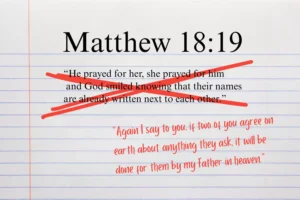Three years ago, my husband and I spent the two weeks leading up to Christmas in the hospital. Our son had been misdiagnosed with a serious childhood illness, and doctors conducted test after test, trying to determine what was actually wrong. As Christmas — a joyful, peaceful holiday — inched closer, I didn’t feel very joyful or peaceful. (Thankfully, my son made a full recovery and that hospital stay is now a distant memory.)
In some ways, this year feels a bit similar. Pain in the world around me is terribly evident. Wars. Political unrest. Tragedy. Death. You don’t have to look far to see something that dims the light of this joyful season.
Last year, Justin Taylor presented the true story of how Henry Wadsworth Longfellow came to write the poem, “I Heard the Bells on Christmas Day.” During the Civil War, Longfellow’s eldest son was critically injured and nearly paralyzed in battle. Not even two years after his wife was killed when her dress caught on fire (as he helplessly tried to save her), Longfellow rushed to his son’s bedside. Tragedy upon tragedy. Grief upon grief. Taylor writes:
On Christmas day, 1863, Longfellow — a 57-year-old widowed father of six children, the oldest of which had been nearly paralyzed as his country fought a war against itself — wrote a poem seeking to capture the dynamic and dissonance in his own heart and the world he observe[d] around him. He heard the Christmas bells that December day and the singing of “peace on earth” (Luke 2:14), but he observed the world of injustice and violence that seemed to mock the truthfulness of this optimistic outlook. The theme of listening recurred throughout the poem, eventually leading to a settledness of confident hope even in the midst of bleak despair.
How do we reconcile the extreme pain we see and experience in life with God’s promise of hope? We don’t. We leave that to Him. We choose to believe the truth of His Word. We choose to trust in His good character. And most of all, we choose to believe that this is not all there is. God entered into the world in the flesh to bring the hope people desperately needed.
The people of the Middle East, during that first Christmas, were in the midst of turmoil too. Those in Jerusalem and surrounding areas lived under the brutal rule of the Romans. Like us, they longed for deliverance from their hopeless circumstances. And God gave them just that.
The last two stanzas of Longfellow’s poem capture this beautifully:
And in despair I bowed my head;
“There is no peace on earth,” I said;“For hate is strong,
And mocks the song
Of peace on earth, good-will to men!”
Then pealed the bells more loud and deep:
“God is not dead, nor doth He sleep;The Wrong shall fail,
The Right prevail,
With peace on earth, good-will to men.”
Despite the tragedies we all experience in varying degrees, God is not dead. Right will prevail because it is God’s character and His promise — a promise that came in the form of a Baby swaddled in a manger. While pain certainly changes Christmas, it does not ruin it; it makes it more real, more needed. Cling to the message this season and share it freely with others. God knows we all need it. Even when the temporary circumstances don’t line up with the eternal truth, peace on earth and goodwill to men is God’s great gift to us.











